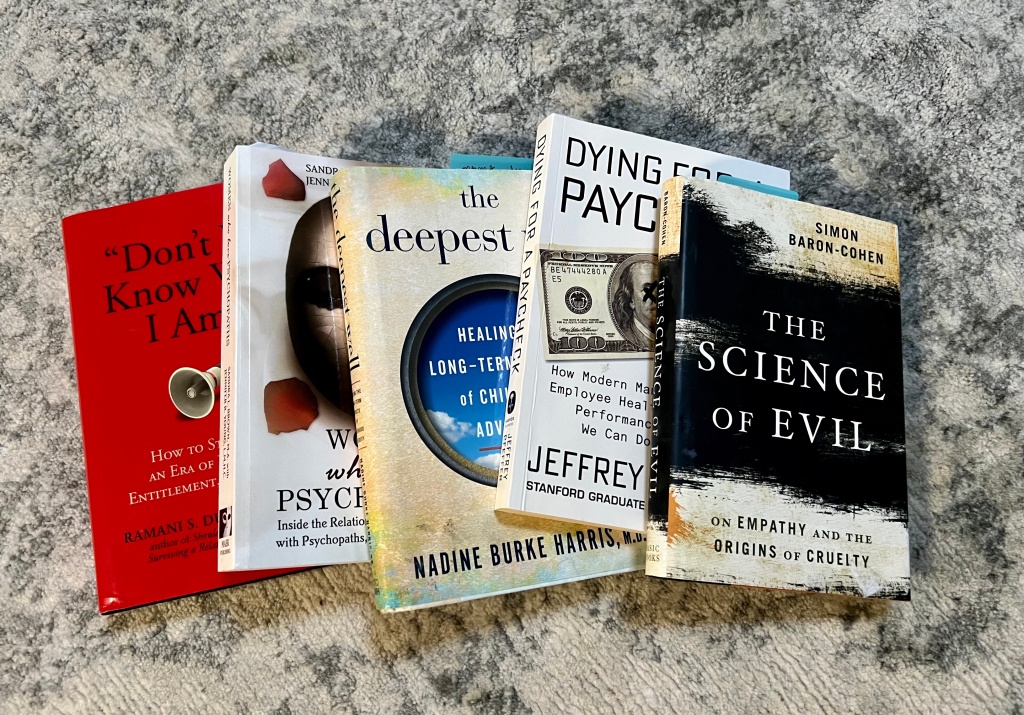As I have said many times in this blog, knowledge is power. The vast majority of us who got caught up in a toxic relationship with someone highly narcissistic simply did not know who and what we were dealing with. We didn’t know the typical patterns or the red flags, and we didn’t have a good snake identification guide. And so most of us personalized the treatment we received, and tried to deal with the issues individually, rather than understanding that this is a much larger problem than that. Some have even said the biggest health threat we have today are toxic systems and relationships.[1]
And so, what are some good resources for understanding relational trauma, narcissistic abuse, and the process of healing? There are so many it’s hard to know where to stop, but here are ten of my current favorites.
ONE: Anything by the amazing Dr. Ramani Durvasula, who goes by Dr. Ramani. She has a very robust YouTube channel and a wonderful podcast, Navigating Narcissism. I also love her book Don’t You Know Who I Am? She is grounded, compassionate, and brilliant. Highly recommend.
TWO: Dr. Les Carter, also on YouTube at Surviving Narcissism. Great advice from a therapist with a heart of gold.
THREE: A Little Bit Culty podcast. Hosted by NXIVM survivors Sarah Edmondson and Anthony “Nippy” Ames. Highly informational (and entertaining). Not only a great resource on cultic abuse, they also cover many things narcissistic.
FOUR: Adult Children of Emotionally Immature Parents, by Lindsay Gibson. One of the best books I’ve read about the impact of growing up with toxic parents. I recommend to everyone.
FIVE: The Deepest Well, by Nadine Burke Harris, M.D. Fascinating overview of the lifelong impact of the trauma of Adverse Childhood Experiences.
SIX: The Science of Evil, by Simon Baron-Cohen. This is a very thorough research-based look at many different types of empathy and how they show up (or rather, don’t) in narcissists, sociopaths, and psychopaths.
SEVEN: The Psychopath Inside, by James Fallon. A neuroscientist discovers he has the brain structure and genes of a psychopath, and takes us into his world.
EIGHT: The Covert Passive-Aggressive Narcissist, by Debbie Mirza. I devoured this book, because it so spoke to my own experience with the type of narcissist it can be harder to recognize: the covert or “victim” narcissist.
NINE: Women Who Love Psychopaths, by Sandra Brown. This covers the research on Super Traits and explains why it’s not always the co-dependent personality who ends up with a toxic person.
TEN: Dying for a Paycheck by Stanford University professor Jeffrey Pfeffer. The true cost of toxic workplaces written by a respected business professor. When asked what surprised him as he was writing the book he said “Two things. One, it is way worse than I thought. And two, nobody seems to care.”

We also keep an evolving list on our website, so check there as well!
—————————-
In the process of healing and need some support? Our relational trauma group coaching program starts late September 2022. Or contact Ann for one-to-one coaching.
—————————-
Want to learn how to work with relational trauma as a coach? Join our next Certification Program for Neuroscience, Coaching and Relational Trauma starting January 2023.
ABOUT THE AUTHOR
Ann Betz is the co-founder of BEabove Leadership and an expert on the intersection of neuroscience, coaching, trauma and human transformation. She speaks, trains and coaches internationally, and writes about neuroscience and coaching as well as relational trauma. Ann is also a published poet who loves cats, rain in the desert, and healthy relationships. She is deeply appreciate and endlessly grateful for the wisdom of these YouTubers, authors, and researchers.
[1] See Dying for a Paycheck.

2 thoughts on “Knowledge is Power: Ten Favorite Resources for Understanding and Healing from Narcissistic Abuse”